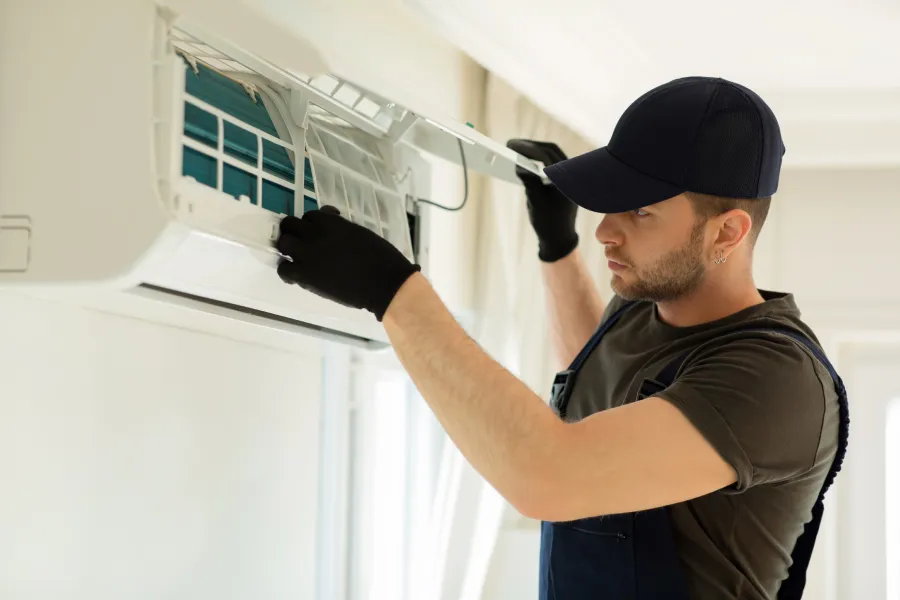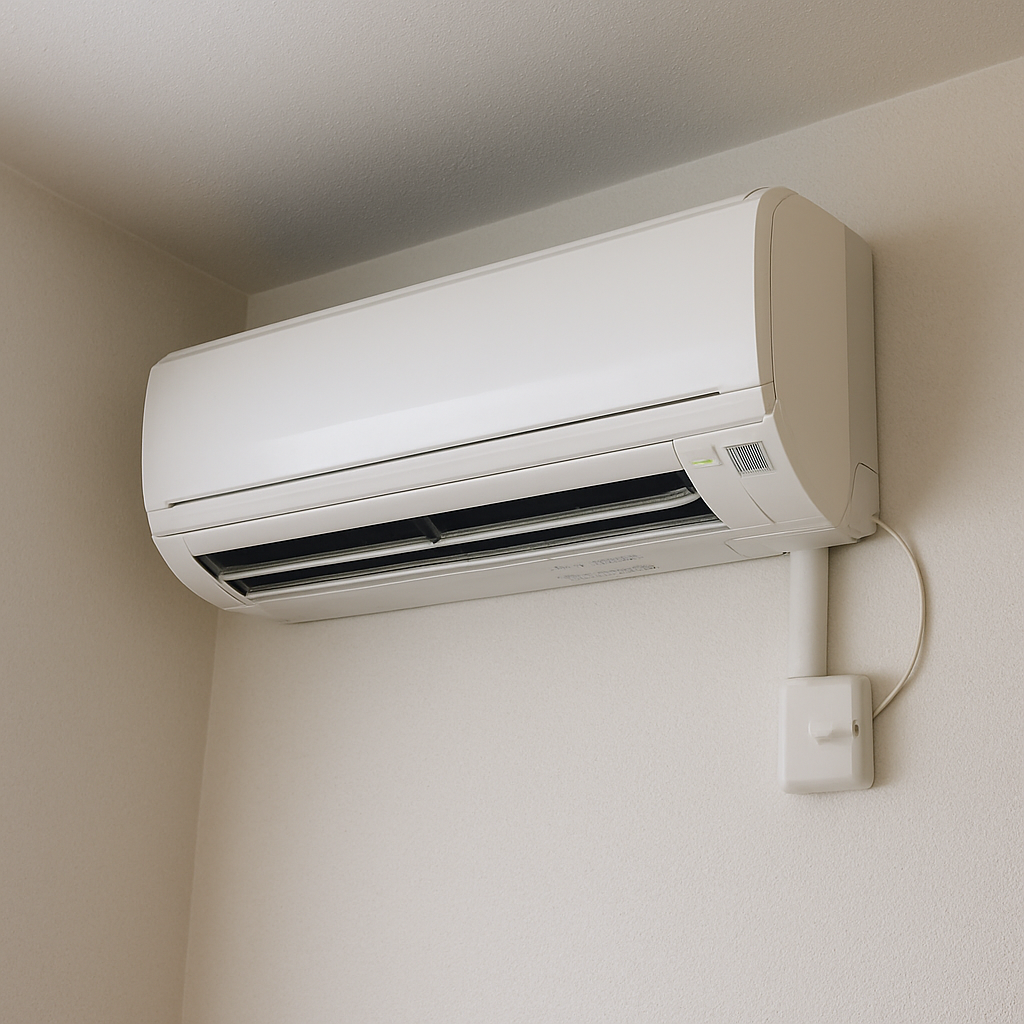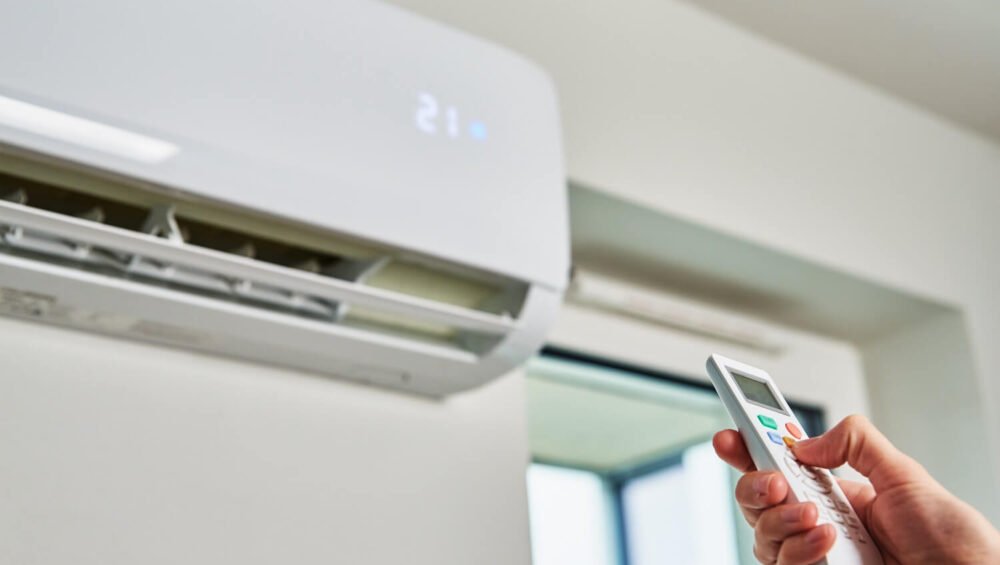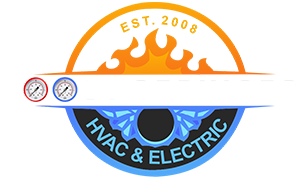As the sweltering summer heat rolls in, having a reliable air conditioner becomes more than just a luxury—it’s an absolute necessity for comfort and health. Whether you’re a community-based entrepreneur looking to enhance your business space or a working-class individual seeking a swift solution to combat the heat, understanding the costs involved in installing or replacing an air conditioner is crucial. This comprehensive guide will break down the average costs and critical factors to consider when budgeting for your new air conditioner, ensuring you make an informed decision.

The cost of installing a new air conditioner can vary widely based on several factors. Let’s explore the primary considerations that will affect your overall expenses in detail:
Table of Contents
Factors That Influence Air Conditioner Cost: Type, Size, Efficiency, and Installation
Type of Air Conditioner
The type of air conditioning unit you choose plays a significant role in determining your overall expenditure. Options typically include window units, portable units, ductless mini-split systems, and central air conditioning systems. Each type comes with its own cost range and installation requirements.
- Window Units and Portable ACs: These are usually the most affordable, ranging from $150 to $750. They are ideal for smaller spaces, such as single rooms or small apartments, and are relatively easy to install. However, they might not be efficient for larger areas, potentially leading to uneven cooling and higher energy consumption if overworked.
- Ductless Mini-Split Systems: These cost more upfront, typically between $2,000 and $7,000, but they offer flexibility and efficiency for both single and multi-room cooling. Ductless systems are ideal for homes without existing ductwork or for those who want to add air conditioning to specific areas without the expense of installing ducts.
- Central Air Conditioning Systems: If you have existing ductwork, the cost to install central air can range from $3,000 to $7,000. However, if new ductwork installation is required, costs can rise to $10,000 or more. Central systems provide comprehensive cooling and are a valuable investment for larger homes or properties.
Size and Capacity
The size of the AC unit you need depends on the square footage of the area you intend to cool. An undersized unit may struggle to cool the space adequately, resulting in constant operation and higher energy bills. Conversely, an oversized unit can cycle on and off too frequently, leading to increased wear and higher maintenance costs. It’s essential to get a professional assessment to determine the right size for your needs.
- Calculating BTUs: Air conditioner capacity is measured in British Thermal Units (BTUs). To calculate the BTUs needed, multiply the square footage of the space by 20 BTUs per square foot. Adjustments might be necessary depending on ceiling height, sun exposure, and climate.
- Professional Assessment: Engaging a professional HVAC technician to assess your space ensures the correct unit size is chosen, optimizing performance and energy efficiency. This assessment will consider factors such as room layout, window placement, and insulation quality.
- Long-Term Efficiency: Choosing the right size unit not only impacts immediate cooling effectiveness but also affects long-term operational costs. An appropriately sized system will have a longer lifespan and require less frequent repairs.
Installation Complexity
If your property already has ductwork in place, the cost to install a new central air system can be significantly lower. However, if ductwork installation is required, this can add substantially to the overall cost. Additionally, the layout of your property can influence installation complexity and cost.
- Existing Infrastructure: Properties with pre-existing ductwork can see reduced installation costs, as the basic infrastructure is already in place. This reduces labor time and material needs.
- New Ductwork Installation: Installing new ductwork involves additional labor and materials, increasing overall costs. Factors such as home layout, accessibility, and construction type can further impact pricing.
- Property Layout Considerations: The complexity of your property’s layout—such as multi-story buildings or homes with limited access points—can increase installation difficulty and costs. Professional HVAC contractors will assess these factors during initial consultations.
Efficiency and Features
Investing in a high-efficiency air conditioner might have a higher upfront cost, but it can lead to substantial savings on your energy bills over time. Look for units with high SEER (Seasonal Energy Efficiency Ratio) ratings, which indicate better energy efficiency.
- SEER Ratings Explained: The SEER rating measures the cooling output during a typical cooling season divided by the total electric energy input. Higher SEER ratings mean better energy efficiency and potential cost savings on utility bills.
- Advanced Features: Consider models with advanced features like smart thermostats, variable speed compressors, and zoning capabilities. These features enhance comfort and efficiency, providing more precise control over your cooling environment.
- Long-Term Savings: While high-efficiency units may require a larger initial investment, the reduced energy consumption can lead to significant savings over the lifespan of the system. Additionally, many newer models offer improved environmental benefits, contributing to a reduced carbon footprint.
Average Costs for Air Conditioner Replacement

When considering replacing an old AC unit, it’s helpful to know the average cost to replace the system. Here’s a detailed breakdown of potential expenses you might encounter:
Average Cost to Replace AC Unit
Typically ranges from $3,500 to $7,500, depending on the type and efficiency of the unit. Replacing an existing unit often involves more than just swapping out the old system; it can also include adjustments to existing ductwork or electrical systems.
- Unit Type and Efficiency: The specific type and efficiency of the unit you choose will significantly impact replacement costs. Higher efficiency models will generally have a higher upfront cost but offer better long-term savings.
- Labor and Installation Fees: Professional installation is crucial to ensure optimal performance and efficiency. Labor costs can vary based on the complexity of the installation and local market rates.
- Additional Modifications: Depending on the condition of your existing system, additional modifications may be necessary, such as upgrading electrical systems or repairing ductwork. These factors can add to the overall replacement cost.
Central Air Conditioner Replacement Cost
This can range from $4,000 to $10,000, factoring in the cost of the unit, labor, and any additional necessary modifications. Central systems are often more complex, requiring detailed planning and installation.
- Unit Cost and Installation: The cost of the central unit itself varies based on brand, size, and efficiency. Installation costs will depend on whether existing ductwork is used or new ducts need to be installed.
- Energy Efficiency Considerations: Investing in a high-efficiency central air system can result in substantial long-term savings. Look for systems with high SEER ratings to maximize energy efficiency.
- Potential Upgrades: When replacing a central system, consider upgrading related components such as thermostats or air filtration systems to enhance overall performance and indoor air quality.
New AC System Cost
If you’re installing a completely new system, including ductwork, expect costs to start around $6,000 and potentially exceed $15,000 for high-efficiency systems. New installations offer the opportunity to customize the system to your specific needs and preferences.
- Comprehensive Planning: New installations require detailed planning to ensure optimal system design and placement. This includes determining the best locations for units and ductwork to maximize efficiency and comfort.
- High-Efficiency Options: Investing in a high-efficiency system can significantly reduce long-term operational costs. Consider systems with advanced features such as zoning capabilities or smart home integration for enhanced control.
- Long-Term Investment: While new installations can be costly upfront, they represent a long-term investment in comfort and energy savings. Properly designed and installed systems can provide reliable performance for many years.
Tips for Budgeting and Saving
Get Multiple Quotes
When planning your budget, it’s wise to obtain estimates from several HVAC contractors. This allows you to compare prices and services, ensuring you receive the best value for your investment. At BOOST SERVICES, we pride ourselves on providing transparent, competitive pricing to our Pasadena community.
- Comparative Shopping: Requesting quotes from multiple contractors provides insight into market rates and service offerings, helping you make an informed decision. Be sure to compare not only price but also the scope of services provided.
- Evaluating Contractor Expertise: Consider the experience and reputation of contractors when reviewing quotes. Reliable contractors should provide detailed estimates and be willing to answer questions about their recommendations.
- Negotiation Opportunities: Having multiple quotes can provide leverage for negotiations, potentially leading to cost savings or added services. Don’t hesitate to discuss options and ask for discounts or promotions.
Consider Financing Options
Many HVAC companies offer financing plans, allowing you to spread the cost of a new system over time. This can make high-efficiency systems more accessible, reducing the immediate financial burden.
- Financing Plan Benefits: Financing can provide flexibility in managing the cost of a new system, allowing for monthly payments rather than a large upfront expense. This can make it easier to budget for high-quality, energy-efficient options.
- Interest Rates and Terms: When considering financing, carefully review interest rates and terms to ensure they align with your financial situation. Look for plans with competitive rates and flexible repayment options.
- Long-Term Financial Planning: Consider how financing fits into your overall financial plan. A well-chosen financing option can help manage costs while allowing you to invest in a system that meets your long-term needs.
Look for Rebates and Incentives
Some utility companies and government programs offer rebates or tax incentives for installing energy-efficient air conditioning systems. These can help offset the initial cost and provide long-term savings.
- Research Available Programs: Investigate local, state, and federal programs offering rebates or tax credits for energy-efficient installations. These incentives can vary by location and may change over time.
- Eligibility Requirements: Ensure you understand the eligibility requirements for rebates or incentives, as they may depend on factors such as system efficiency ratings or installation by certified professionals.
- Maximizing Savings: Combining rebates with other savings strategies, such as financing or seasonal promotions, can further reduce the cost of a new system. Be proactive in seeking out opportunities to maximize savings.
Regular Maintenance
Investing in regular maintenance for your AC unit can extend its lifespan and improve efficiency, ultimately saving you money on replacements and energy bills in the long run.
- Routine Inspections: Schedule regular inspections by qualified technicians to identify and address potential issues before they become major problems. This proactive approach can prevent costly repairs and prolong system life.
- Filter Replacement and Cleaning: Regularly replacing filters and cleaning components like coils and fans can improve system efficiency and indoor air quality. Set reminders to perform these tasks as recommended by the manufacturer.
- Professional Tune-Ups: Annual tune-ups by HVAC professionals can optimize system performance, ensuring it operates at peak efficiency. These services can include checking refrigerant levels, tightening connections, and calibrating thermostats.
Why Choose BOOST SERVICES?

At BOOST SERVICES, we understand the urgency and importance of having a functional air conditioning system, especially during the hot Pasadena summers. Our dedicated team is committed to providing top-notch customer service and satisfaction, ensuring you receive reliable, expert solutions tailored to your needs.
Expertise in Residential and Commercial Properties
Whether you need a new system for your home or business, our experts are ready to assist. We have extensive experience in both residential and commercial HVAC installations, ensuring each project is handled with precision and care.
- Tailored Solutions: We work closely with clients to design and implement systems that meet specific needs and preferences, ensuring optimal performance and comfort.
- Comprehensive Services: From initial consultation to final installation, our team provides comprehensive services to guide you through every step of the process.
- Commitment to Quality: We use only high-quality equipment and materials, ensuring long-lasting performance and reliability for all installations.
Quick and Efficient Service
We know your time is valuable, and we strive to complete installations swiftly without compromising quality. Our team is trained to work efficiently, minimizing disruption to your daily routine.
- Streamlined Processes: Our installation process is designed for efficiency, allowing us to complete projects on time and within budget.
- Attention to Detail: While speed is important, we never sacrifice quality. Each installation is meticulously checked to ensure it meets our high standards.
- Responsive Support: Our team is readily available to address any questions or concerns, providing prompt and effective support throughout the installation process.
Community-Oriented Approach
As a trusted HVAC contractor in Pasadena, we prioritize building strong relationships with our clients, offering personalized solutions and exceptional service.
- Local Expertise: Our team has deep roots in the Pasadena community, providing us with unique insight into local needs and preferences.
- Customer-Centric Focus: We prioritize customer satisfaction, ensuring each client receives personalized attention and solutions tailored to their specific requirements.
- Ongoing Engagement: We maintain open lines of communication with our clients, offering support and guidance long after installation is complete.
Get Started Today
Don’t let the heat catch you unprepared. Contact BOOST SERVICES today to discuss your air conditioning needs and receive a personalized quote. Call us at 818-277-5056 or 747-264-6358. Our team is ready to help you find the perfect solution for your cooling needs.
With BOOST SERVICES, you can trust that your comfort and satisfaction are our top priorities. Our commitment to quality, efficiency, and community ensures you receive the best service possible, allowing you to enjoy a comfortable and cool environment all summer long.
FAQ — Budgeting for Your New Air Conditioner
What is a realistic budget range for a new air conditioner?
Total project cost varies by home size, efficiency, and install complexity. Many full replacements (equipment + labor) land in a mid four-figure to low five-figure range depending on scope and local rates.
Which factors most affect the final price?
Key cost drivers include:
- System size/capacity (BTUs or tons)
- Efficiency rating (SEER2/EER) and brand tier
- Ductwork condition, sealing, resizing, or replacement
- Electrical upgrades and code/permit requirements
- Installation accessibility and complexity
- Local labor rates and seasonal demand
How much contingency should I add to my budget?
Plan a 10–20% contingency for surprises like duct repairs, electrical updates, line-set replacement, or structural adjustments discovered during installation.
What additional or “hidden” costs should I expect?
Common add-ons include:
- Permits and inspections
- Thermostat or control upgrades
- Line-set flush or replacement and refrigerant
- Concrete pad, vibration isolators, or drain improvements
- Old equipment removal and haul-away
Is paying more for a higher-efficiency unit worth it?
Often yes. Higher efficiency increases upfront cost but can lower monthly utility bills, improve comfort, and may qualify for rebates or tax incentives that improve lifetime value.
How do I compare quotes fairly across contractors?
Request written, itemized proposals listing model numbers, efficiency ratings, scope of duct/electrical work, warranty terms, and permit fees to evaluate true apples-to-apples pricing.
Should I replace the air handler or furnace at the same time?
Not always necessary, but matching components can boost performance, ensure compatibility, and sometimes reduce total labor compared with separate projects.
What financing options can help with budgeting?
Many HVAC companies offer payment plans or third-party financing. Some utilities provide low-interest loans or on-bill financing for qualifying high-efficiency upgrades.
Can rebates or tax credits lower my net cost?
Yes. Utility rebates, manufacturer promotions, and government incentives for efficient equipment can significantly reduce the final price—check eligibility and deadlines before purchasing.
How do I prepare to get accurate estimates?
Before requesting bids, gather home square footage, note insulation/windows, share details on existing equipment and ductwork, define comfort goals, and ask for itemized quotes with load calculations.
What installation timeline should I budget for?
Straight replacements often take one day. Projects involving duct changes, electrical upgrades, or difficult access typically require two to three days or more, increasing labor cost.
How do warranties impact my budget?
Expect separate manufacturer (equipment) and installer (labor) warranties. Longer terms and optional extended coverage can reduce future out-of-pocket repair risk.
How can I lower costs without sacrificing quality?
Compare 2–3 bids, select a strong value efficiency tier (not necessarily the absolute top), schedule work off-peak, leverage rebates, and prioritize a reputable installer for long-term savings.
What ongoing costs should I plan after installation?
Budget for annual maintenance, filter replacements, occasional coil cleaning, and thermostat or sensor replacements over the system’s life to protect efficiency and warranties.
When does it make sense to repair instead of replace?
Consider repair when the unit is relatively young and the issue is minor. If major components are failing, efficiency is poor, or repair costs approach a large share of replacement, upgrading is usually wiser.
What quick checklist should I review before finalizing the budget?
Confirm:
- Correct system sizing via load calculation
- Chosen efficiency tier and projected energy savings
- Scope and cost of duct and electrical work
- Permits, inspections, and haul-away included
- Rebates/credits applied and final net price


Checked out 1777szpakistan. A bit of a niche thing, but if you’re looking for it, then you’re in luck. Explore at your own risk! 1777szpakistan
Hey guys! For Soi Cau XSMB, I’ve been checking out soicauxsmbkubet lately. Still trying to figure out the magic formula, but it’s got some interesting angles. Let’s get that winning number!